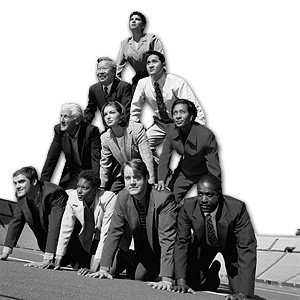
Rndballref
20 Years Experience
Chicago, IL
Male, 60
For twenty years I officiated high school, AAU and park district basketball games, retiring recently. For a few officiating is the focus of their occupation, while for most working as an umpire or basketball referee is an avocation. I started ref'ing to earn beer money during college, but it became a great way to stay connected to the best sports game in the universe. As a spinoff, I wrote a sports-thriller novel loosely based on my referee experiences titled, Advantage Disadvantage
If NFHS rules are being enforced, leaving the bench to join the fight is a flagrant technical foul resulting in immediate player ejection. However, if more than one player from a team leaves the bench the other team shoots only 2 technical shots even though multiple players are ejected from the game. In Illinois all the ejected players are also suspended for the next game. AAU and other league rules may differ.
The placement of a throw in after a time out is the same as the placement after a violation or a non-shooting foul. The spot should be perpendiclar to nearest sideline oe endline. So imagine a diagonal line from the elbow of the free throw line to the corner of the sideline/endline. If the ball was on the sideline area of that line then find a perpendicular line to the sideline. If it is on the other side of the diagonal then the ball goes to the endline. If the ball was in the paint, then it is taken out on the endline at the closest line of the paint - never on the endline directly under the basket.
The ball is awarded opposite the team which touched the ball last before the ball went out of bounds. The referee is considered part of the floor where he/she is standing.
Team A dribbles the ball off the ref's foot and then it goes out of bounds, Team B gets a throw in.
The defender always has the rights to his vertical space whether he hits the ball or not. Based on how you describe it, I would see it as a good block, no foul.
Hotel Front Desk Agent
 Why do hotel room toilets clog so easily?
Why do hotel room toilets clog so easily?
HR Executive
 What's the worst reaction you ever witnessed during a lay-off?
What's the worst reaction you ever witnessed during a lay-off?
Call Center Employee (Retail)
 Do you think it's just a matter of time before all U.S. companies move their customer support overseas?
Do you think it's just a matter of time before all U.S. companies move their customer support overseas?
A player is allowed to fumble the ball after gaining possession, and then dribble if he has not dribbled heretofore. BUT, the fumble has to be unintentional in the eyes of the official.
There are no specifications in the rule book as to when a referee asks home management to eject a fan. It is very subjective, and it does not have to have a warning. I drew the line at personal attacks - to another fan, the other team, my partners, or to me. I never minded if fans boo'd my calls, but as soon as it got personal or vial, that's when I had someone ejected.
Let's stop beating around the bush here. Tell me what you did to get tossed out of your son or daughter's game.
If the player controlled the pass and purposely knocked the ball down, then it began his dribble. If the player reached out to catch the ball and the ball fell to the ground, then it is a muff and did not start the dribble. It is a judgement call by the official.
-OR-
 Login with Facebook
Login with Facebook (max 20 characters - letters, numbers, and underscores only. Note that your username is private, and you have the option to choose an alias when asking questions or hosting a Q&A.)
(A valid e-mail address is required. Your e-mail will not be shared with anyone.)
(min 5 characters)
By checking this box, you acknowledge that you have read and agree to Jobstr.com’s Terms and Privacy Policy.
-OR-
 Register with Facebook
Register with Facebook(Don't worry: you'll be able to choose an alias when asking questions or hosting a Q&A.)